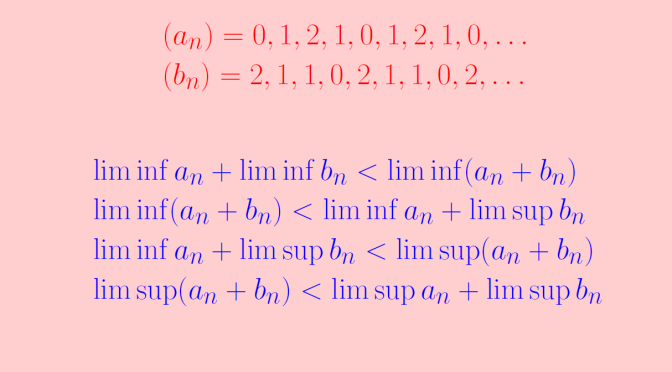Let’s consider real sequences \((a_n)_{n \in \mathbb N}\) and \((b_n)_{n \in \mathbb N}\). We look at inequalities involving limit superior and limit inferior of those sequences. Following inequalities hold:
\[\begin{aligned}
& \liminf a_n + \liminf b_n \le \liminf (a_n+b_n)\\
& \liminf (a_n+b_n) \le \liminf a_n + \limsup b_n\\
& \liminf a_n + \limsup b_n \le \limsup (a_n+b_n)\\
& \limsup (a_n+b_n) \le \limsup a_n + \limsup b_n
\end{aligned}\] Let’s prove for example the first inequality, reminding first that \[
\liminf\limits_{n \to \infty} a_n = \lim\limits_{n \to \infty} \left(\inf\limits_{m \ge n} a_m \right).\] For \(n \in \mathbb N\), we have for all \(m \ge n\) \[\inf\limits_{k \ge n} a_k + \inf\limits_{k \ge n} b_k \le a_m + b_m\] hence \[\inf\limits_{k \ge n} a_k + \inf\limits_{k \ge n} b_k \le \inf\limits_{k \ge n} \left(a_k+b_k \right)\] As the sequences \((\inf\limits_{k \ge n} a_k)_{n \in \mathbb N}\) and \((\inf\limits_{k \ge n} b_k)_{n \in \mathbb N}\) are non-increasing we get for all \(n \in \mathbb N\), \[\liminf a_n + \liminf b_n \le \inf\limits_{m \ge n} \left(a_m+b_m \right)\] which leads finally to the desired inequality \[\liminf a_n + \liminf b_n \le \liminf (a_n+b_n).\]
In fact, all inequalities above can be strict. For example, take \(a_n = (-1)^n\) and \(b_n = -(-1)^n\) we have for all \(n \in \mathbb N\): \(a_n+b_n=0\), \(\liminf a_n = \liminf b_n =-1\). Hence \(\liminf a_n + \liminf b_n = -2\) while \(\liminf a_n + b_n = 0\). We can even find sequences \((a_n)_{n \in \mathbb N}\) and \((b_n)_{n \in \mathbb N}\) such that the four inequalities are simultaneously strict. For this, consider the sequences \[
\begin{aligned}
& (a_n) = 0, 1, 2, 1, 0, 1, 2, 1, 0, \dots \text{ with } \liminf a_n=0, \, \limsup a_n=2\\
& (b_n) = 2, 1, 1, 0, 2, 1, 1, 0, 2, \dots \text{ with } \liminf b_n=0, \, \limsup b_n=2
\end{aligned}\] We have \[
\begin{aligned}
& (a_n + b_n) = 2, 2, 3, 1, 2, 2, 3, 1, 2, \dots \\
&\text{and } \liminf (a_n+b_n)=1, \, \limsup (a_n+b_n)=3
\end{aligned}\] which leads to
\[\begin{aligned}
& \liminf a_n + \liminf b_n &= 0\\
& \liminf (a_n+b_n) &= 1\\
& \liminf a_n + \limsup b_n &= 2\\
& \limsup (a_n+b_n) &= 3\\
& \limsup a_n + \limsup b_n &= 4
\end{aligned}\]
Other interesting topic is that the inequality \[\liminf a_n < \limsup b_n\] can also hold while for all \(n \in \mathbb N\) \(a_n > b_n\). This is the case for the sequences \[
\begin{aligned}
& a_n = \begin{cases}
2 & \text{if } n \text{ is odd}\\
0 & \text{if } n \text{ is even}
\end{cases}\\
& b_n = \begin{cases}
1 & \text{if } n \text{ is odd}\\
-1 & \text{if } n \text{ is even}
\end{cases}
\end{aligned}\]

